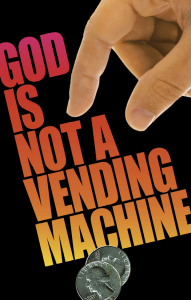 “What can I do?” is the immediate thought of most people when the question of going to heaven is raised.
“What can I do?” is the immediate thought of most people when the question of going to heaven is raised.
If someone asked you about salvation and the way to heaven, would your answer be, “We each have to do our very best”? Then, if you were asked for something specific, would your list include being a good parent, attending church regularly, being honest, helping others, and any number of other requirements most people assume are on God’s checklist?
Now, if I tell you that you’re wrong, will you become angry and throw this tract away? There is a right answer to the question, “How can I get to heaven?” No doubt good works are a necessary part of the Christian life, but according to what God tells us, good works don’t come first.
When you were taught the alphabet, you learned the letters in their correct order. The letter D is in the alphabet, but its place is fourth, not first. In Matthew 18:3, Jesus says, “Except ye … become as little children, ye shall not enter into the kingdom of heaven.” Following His instruction to learn as a little child, you must begin with God’s A, B and C and not put D at the beginning.
Read no further until you accept the fact that what God says is true and that each of us is a sinner in His eyes. But He doesn’t just give up on us because we are sinners; He loves us too much for that. He has a remedy for sinners, and it is explained under the letter B.
No one can claim they have salvation until they truly believe on the Lord Jesus Christ. If you will trust Christ for salvation and Him only, that is all that is necessary — salvation is yours! The letter C explains the wonderful work He did to provide salvation for you.
If you acknowledge that you are a sinner according to A and if you believe on Christ according to B, C tells you that Christ has already suffered for your sins. You committed the sins; Christ bore the punishment in your place. Now God can give you — not the punishment, which Christ has already completely exhausted — but His gift of salvation, which is eternal life through Jesus Christ our Lord.
That’s how you can be sure you will spend eternity in heaven. Now, are you going to just forget about what you’ve read here and go on as before — without God and without heaven for your future? Or will you give this matter serious consideration and believe God’s A‑B‑C? It is God’s way of salvation and the only way to have a guaranteed future in heaven.
The matter of doing good works has not come up so far, because Christ has done it all. All that is necessary for your salvation has been completed, and you may simply rest on what He has already done. The moment you trust in Him for salvation, you are saved from your sins and assured of spending eternity in heaven.
Up to this point, there has been no mention of the fourth-place letter — D. This comes after you have understood and obeyed the first three letters.
The doing part comes last, as the result of your having received eternal life. You can never receive eternal life by earning it; the good works now prove that you really possess it.
“Neither is there salvation in any other: for there is none other name under heaven given among men, whereby we must be saved” (Acts 4:12).








